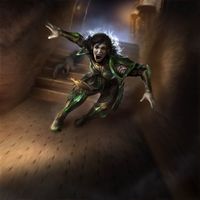Lore:Quarra Clan
- "Above all clans, we stand alone! We have few limitations to our power, so great is our gift. Our dark powers make us the perfect predators. Those who live in the sunlight fear our name." —Quarra Clan motto[1]
The Quarra Clan is one of the three major vampire bloodlines found in Vvardenfell and the Telvanni Peninsula. It was founded by the Imperial Volrina Quarra sometime in the mid-Second Era, after she went on a mission to destroy the Berne Clan for killing her brother.[2][3] The Warriors of the Quarra fear nothing, and with good reason. Of all the Vvardenfell clans, they are the strongest physically.[1] They are not subtle, and would rather slaughter an entire village than choose a few on which to feed. The Quarra were known to prey on outsiders who came by the cemetery near Necrom at night, until they were eradicated by mercenaries hired by the Temple.[4] By the end of the Third Era, Clan Quarra was still led by Volrina Quarra and from the Dwemer ruin of Druscashti. They also had a presence in the many ancestral tombs around the island.
Some sources claim that Volrina Quarra was slain in 3E 427, as a vial of her blood was wanted by both Mistress Dratha of House Telvanni[5] and the Berne Clan;[6] and that the Aundae Clan then killed many of the remaining members of the clan.[7][8] Among King Helseth's changes to the traditional power structure of Morrowind circa 3E 429, it was suspected that there could be a revolutions in the shadows among vampires that sought to overturn the old ways of the Quarra.[UOL 1]
Notes[edit]
- During the development of Skyrim, there were plans for the Quarra to have a presence in Haafingar circa 4E 201. They would have been headquartered in Pinemoon Cave and led by a vampire named Jelkar.[UOL 2]
See Also[edit]
- For game-specific information, see the Morrowind article.
References[edit]
- ^ a b Quarra Unique Dialogue in Morrowind
- ^ Volrina Quarra's dialogue in ESO
- ^ Volrina's Notes — Volrina Quarra
- ^ Incident in Necrom — Jonquilla Bothe
- ^ Blood for Mistress Dratha quest in TES3 Morrowind.
- ^ The Blood of the Quarra quest in TES3 Morrowind.
- ^ The Vampire Hunter quest in TES3 Morrowind.
- ^ The Vampire Merta quest in TES3 Morrowind.
Note: The following references are considered to be unofficial sources. They are included to round off this article and may not be authoritative or conclusive.
- ^ Ted Peterson's posts in Playing Houses
- ^ Cut vampire quests in Skyrim
